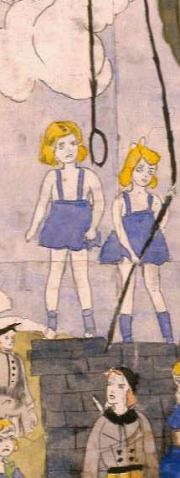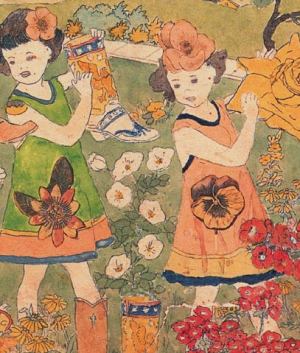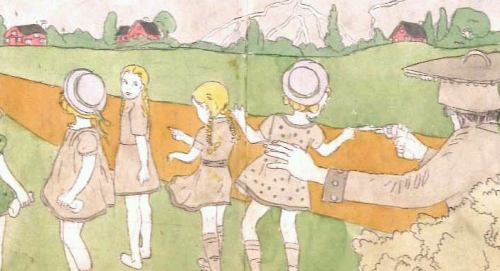


I arrive at the top floor of S-Meg Tower early enough to sequester a handful of highlighter pens from the abundance of stationery hoarded on the desk of Ms Fang the hunter-killer secretary. In my office, I test one on the whiteboard, writing…
The revenge of Tung continues. The latest disaster dating back to the crop-haired one’s reign of despair is the Ngong Ping Cable Car, due to open this week. Owing to his apparently self-fulfilling belief that Hong Kong is too helpless and inadequate to survive without prostituting itself to millions of Mainland tourists, the city was condemned to host this “iconic new attraction”…
Ngong Ping 360 is destined to become one of Hong Kong’s ‘must do’ attractions, providing a fully integrated and memorable visitor experience.

My heart skips a beat. Something deep within me stirs. Our widely misunderstood, coquettish and saintly former Secretary for Security, Regina Ip, is preparing to return from exile in the United States to be with her people. Many assume she fled in embarrassment after she failed to ram through the Article 23 national security law in 2003. Her friends and admirers know that the widow had long planned to accompany her precious daughter to college that year – not for her the standard practice of Hong Kong mothers to dispatch a Filipino maid to look after their offspring studying overseas.
She has completed a doctorate on the Hong Kong democracy movement, studying under Larry Diamond, an expert on comparative representative government, who will have drummed into her his belief in representative systems as marketplaces for political ideas. Among his pithier comments – “There is no model of governance with any broad normative appeal or legitimacy in the world other than democracy,” and “There is growing international legal and moral momentum toward the recognition of democracy as a basic human right of all peoples.”
What will our much-missed iron butterfly do when she returns? First, she will want to look up all her friends, especially her old contacts in the Central People’s Government in Beijing, to tell them all about the Stanford professor’s exciting ideas and introduce a few of his books to them. Second, she will want a job. She rules out the private sector. Unlike many former civil servants, she does not have the overpowering urge to ‘serve the community’ by securing a sinecure that allows her to get in everyone’s face and condescend them all day. She declares a renewed interest in local civic matters, but denies any intention to rejoin the Government. Which leaves relatively few possibilities. Will she found a political movement? The history books will treat her fairly, she says of Article 23. This is true – I have already written that page…


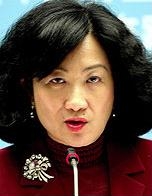
© 2032 by Hemlock
Up early, I am almost alone as I glide down the Mid-Levels Escalator. In the crumbling, thinly gentrified gloom of lower Soho, just above Hollywood Road, I spy a familiar figure sitting on a wall, swinging his legs despondently. Wild American friend Odell has been barred from entering his own apartment. His cruel Thai wife locked him out as punishment for turning up drunk at 5am, rather than sober at 7pm. “Hey,” he shrugs with a smile, “this is Shandong-Hong Kong Economic and Trade Cooperation Week! I thought we should celebrate.”
Shandong… Qingdao… Tsingtao – the beer. Yes, the ex-Mormon confirms, that’s the connection. Yes, it is a terrible excuse. No, it did not impress Mee. I join him on the wall to watch this little patch of Hong Kong come to life. At around 7am, the relatively few individuals of working age descending the hill are mainly involved in some sort of manual labour – semi-manicured, and wearing faded T-shirts and jeans. People forget that this neighbourhood was working class before the escalator was built, and pockets of unskilled low earners survive behind the glitzy restaurants, like some ancient species of trilobite in the back of a cave surrounded by Mother Nature’s latest flora and fauna. By 7.30, the first wearers of ‘smart-casual’ appear, transfixed by their iPods. Probably designers, commuting to low-rent studios in old factories in Kowloon Bay, where they will sit at an Apple Mac churning out vivid pink, yellow and electric blue layouts for corporate brochures. By 8.00, the suits are in evidence. Ambitious junior executives adjusting their ties, heading off for Taikoo Shing or some other second-tier office complex. At 8.30, the commuters are in full flood. These are the pinstriped wheelers, dealers, movers and shakers, carrying briefcases and Blackberries, who work just down the hill, in the central

“So what are we supposed to say?” The Big Boss is sitting behind his father’s old cherry wood table, in the large but dingy office lined with shelves of plaques, engraved silver plates, model aircraft and other corporate gifts. He stops signing cheques and peers at me.
“Well,” I tell him, glancing down at the ‘Line To Take’ from the Government, “they want you to say the following.” I read aloud from the script…

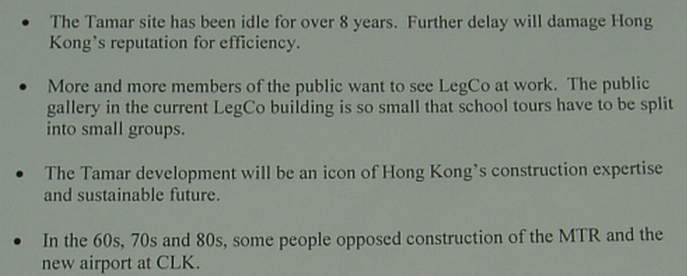
“No – there’s no logical flow. I think you just have to drop them into casual conversation. For example if someone says how much they hate the Tamar project, you can disagree and say…”

“Well,” I reply, trying to be helpful, “maybe you can say something about how you hear lots of people are looking forward to taking their family there, etc, etc.” He grunts and gives me an irritable nod. It’s tough being a friend of Donald these days.
BACK IN the gwailo’s lair, I find four things. First second and third are the Stanleys from the mailroom awaiting their mp3 of the week, which happens to be Blister in the Sun by the Violent Femmes. Fourth is an article by construction workers’ union boss Choi Chun-wa in the South China Morning Post arguing that the Tamar project is essential as it will create 2,500 jobs for his gruff, sweaty, grimy, horny handed, malodorous members.
According to my trusty Casio magic solar-powered calculator, that adds up to a mere HK$2,040,000 per job. We could give 5,000 unskilled, underemployed members of our workforce who can’t afford to live here a million dollars each plus a one-way ticket back to their mainland pig farms, thus relieving our heartbreaking underclass-in-poverty problem and improving the dreadful, Third World gini coefficient at a stroke. When the gap between rich and poor is measured in hundreds of miles, everyone will be happy.
Fri, 23 June
Five patients in a ‘ward of intellectual disability’ at Castle Peak Hospital have suffered bowel looseness and heaving since 20 June, according to the institution’s latest report on inmates’ gastric well-being, or lack thereof. For those whose intellectual disability comes in the form of a prurient and morbid curiosity about the inner workings of public medical facilities and their patients’ digestive systems, there’s more – Queen Elizabeth Hospital also proudly presents an exciting diarrhea and vomiting cases update. If this is a ploy by Hong Kong’s bureaucrats to cure the public of its yearning for open government through aversion therapy, it might work. That’s enough freedom of information, thanks – just cover it up in future.
